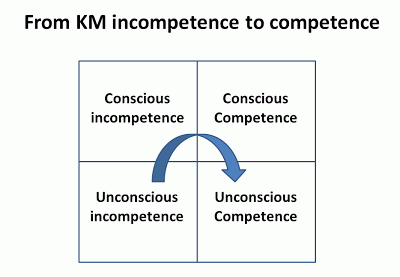Thanks to AI, Explicit Knowledge Is About to Have Its Day in the Sun
In knowledge management (KM), explicit knowledge – what’s written in documents and stored in files or other forms of media – has often had a bad reputation, and for good reason. Over years, KM has wrongly focused on documents and was busy building databases and repositories, when – as David Snowden put it – it shouldhave been focusing on connecting people instead. This preference is understandable. After all, explicit knowledge is just the tip of the iconic knowledge iceberg. Below the surface lies implicit knowledge, thoughts in people’s heads, rich with context and application insights, and accessible only through relationships and trust.
However, I believe what we have been experiencing in 2023 with Generative AI marks a significant shift that could see explicit knowledge get its long-awaited moment in the sun.
The Limitations of Content-focused KM and the
Rise of AI
Traditionally,
KM never succeeded to fully leverage the knowledge that’s supposedly „stored“
in all the documents we write through the course of our careers. The materials we’re supposed to draw on is often out of context, out of date, and proves hard to find and apply. Even if we manage to capture someone’s insights in writing,
it's a gamble. Will it be well-written? Will it be stored in the right place?
Will someone find it, understand it, and, more importantly, find it useful and
applicable? If any link in this chain fails, the entire effort of capturing
that knowledge becomes futile.
What makes
this dynamic worse is that there is just way too much material out there for us to digest and make use of in a meaningful way. So we’re constantly living under
the illusion that we’ve done our research, but deep down we know that we really
just scratched the surface of all the content we ideally should have looked at
to get a full picture.
However, AI
doesn’t have that problem. A Large Language Model doesn’t mind how many
documents and publications there are. It doesn't matter what format or language
is written in, whether content comes in the shape of a glossy publication, an
academic paper, a collection of rough notes or bullet points, or an audio
transcript of a meeting or Youtube video – the AI can search its repository
and extract relevant snippets, examples and evidence, perfectly tailored to the
a user’s question. It can then also transform it into something new that’s
coherent, contextually appropriate, and actionable in a situation at hand. And
it can do all of this without having to rely on users to upload material consistently
in the right place, and tag it with the right categories, and use website navigation
menus or search engines correctly to find it later themselves. None of this
matters. As long as the material is somewhere and can be indexed by the AI
system, the AI will be able to use it. Because one of the big strengths of Generative
AI is its ability to work with imperfect inputs.
What about the role of Social Interactions in
KM?
As someone
who has always advocated a people-focused approach to knowledge management, I
recognize the importance of social context. This was the cornerstone of the
knowledge management strategy I developed and implemented for UNDP in 2014-2017
and remains a key focus in my KM work
until today. The KM community has learned over the years that of the three
pillars „people“, „processes“ and „technologies“, the „people“ component is the
most important one. Which is why I’ve always been a champion of Communities of
Practice and Online Social Networks, which proved to be some of the few real
success stories of KM discipline in the last two decades.
However, we
also have to be honest to ourselves and acknowledge that knowledge exchange and
subsequent value creation – as crucial as it is – is always tremendously serendipitous.
Because we have to be lucky enough for the person with the relevant insight to
be in the right place at the right moment (in the workshop, in the online
discussion, in the Zoom call) when we need it.
Generative
AI, on the other hand, once it has access to all our documented materials and
exchanges, is able to provide (a lot of) that valuable knowledge in a way that is
always and immediately accessible, not bound by time or place.
This does
in no way diminish the importance of social interactions in knowledge
management. In fact, it makes them even more crucial. Because every
conversation, every query on social media, and every interaction in corporate online
communities, every transcript of a meeting or interview contributes to the pool
of explicit knowledge. These interactions leave digital trails that AI can tap
into and contextualize, making the essence of all our interactions available to
everyone.
Rethinking How we View Implicit and Explicit Knowledge
What does
this mean for the future of KM? The emerging capabilities of Generative AI demand
of us to re-evaluate how we view the dichotomy of implicit and explicit knowledge.
We must continue to engage in the rich, contextual conversations through our knowledge
networks and Communities of Practice. But equally, we need to re-embrace the
practice of making our knowledge explicit. Jotting down notes, drafting white
papers, composing blog posts, transcribing oral exchanges — because every act
of turning our implicit thoughts into explicit material, no matter how rough or
unsorted, becomes invaluable.
I urge us
to start the habit of capturing our thoughts and insights in written form, no
matter how unrefined they may seem. By building a record of our thoughts and
exchanges, and making it accessible to our personal AI assistants as well as
our corporate AI systems, we are laying the groundwork for a future where our
collective knowledge can be leveraged far more effectively than before.
I’m not
saying it will be the solution to all our KM challenges in organizations. But
it will a mark a step change in KM, one that I believe is about to transform
how we preserve, access, and most importantly apply the wealth of knowledge
within our organizations.




Comments